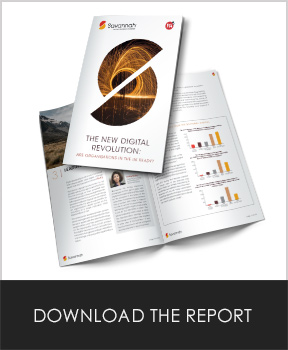This briefing is part of a larger initiative to create a National Digital Benchmark, an initiative prompted by the ongoing digital revolution that is radically reshaping the business environment. The survey is designed to measure the speed of digital transformation in the UK. If you would like to compare your business against the industry norm and best in class, you can access the survey here.
 Organisations in the UK have work to do if they want to keep up with digital-native competitors. That’s according to early results from the National Digital Benchmark survey, created alongside Management Consultancy PA Consulting Group and award-winning speaker and author Professor Venkat Venkatraman.
Organisations in the UK have work to do if they want to keep up with digital-native competitors. That’s according to early results from the National Digital Benchmark survey, created alongside Management Consultancy PA Consulting Group and award-winning speaker and author Professor Venkat Venkatraman.
The interim results from the survey, which several hundred senior executives have responded to so far, suggest that digital transformation is slow within UK organisations, however awareness of a need to evolve and embrace digital is increasing.
Key early findings include:
- 49% agreed that their organisation understood the significance of digital disruption but don’t have the organisational commitment to transform proactively.
- 52% believe that “we over-invest in ‘what we are good at today’ and under-invest in ‘what we should be good at tomorrow’.
- 43% disagree that “our leadership team has been recalibrated so that they now possess digital skills and competencies” versus the 33% that agreed
- 61% are “increasing our focus on competitor intel around digital transformation”
- 61% are “experiencing new digital competition from our traditional competitors”
- Just 31% agreed that “our workforce and culture are adapted for the digital age”
- 49% disagreed that “our HR department has reframed the type of talent we need for our digital future.”
- 50% of executives feel “unconstrained by conventional industry boundaries”
Overview from Professor Venkat Venkatraman
At first glance there appears to be a general acceptance of the significance of digital transformation. An acknowledgment that a digital future is inevitable and few if any organisations are immune from its impact. Organisations and their leaders cannot afford to stand still or rest on past accomplishments. They must move, adapt, transform, survive and conquer. There is growing recognition that new technologies such as data analytics should influence decision making but that the relevant analytical skills are still to be mastered. And, that the digital transformation will profoundly impact job numbers, career and talent management, and the make-up of the workforce.
There is awareness that new organisations are transforming the competitive landscape; that in some cases, over half of existing revenues are potentially at risk. Some leaders are beginning to appreciate the importance of digital business experimentation. Some have established digital innovation labs, others have protected teams, some focus on customer journeys, while others foster grassroots innovation. Executives recognise the importance of finding your place in the value ecosystem and the need to engage in partnerships with companies that may have superior digital competencies. As every industry digitises, traditional companies and digital companies will cooperate to co-create future business models.
On closer inspection, though, an understanding of the significance of digital transformation is not uniform. Nor, perhaps, should we expect all organisations in the UK to be on a fast-track to digital reinvention. Indeed, although, as yet, there is insufficient data for a definitive diagnosis, the interviews and initial results from the survey allow a cautious separation of UK organisations into two distinct camps.
One set of organisations, see digital as a strategic enabler across their different operational elements while the other set—see digital as an add-on. The first group has leaders that recognise the urgency of recalibrating their workforce and leadership team to reflect the requisite digital competences required, while the other group—in our view, mistakenly—believes that they have the luxury of time to prepare for this digital paradigm shifts.
All organisations should be asking “Which group are we in?” Do you belong to an organisation that is willing to reimagine its business purpose in the digital future, as if you were starting over with a blank sheet of paper and redesigning the organisation with digital technology at its core? Or are you in an organisation that is content to focus on strategies that delivered success in the past, unwilling to face up to the extent of disruption a digital future demands?
Dealing with digital invariably involves profound changes, to culture, to strategy, to operations. It is not just delegating responsibility to a digital expert – even if they go by the title of CDO. And it is not something that can be postponed just because the Board is not composed of digital natives.
If there was one message that should be emphasised, that emerged from the conversations with leaders about digital transformation, it is this: the time to move from recognition to response, the time to take action, is not next week, or next month, or next quarter – it is now.




